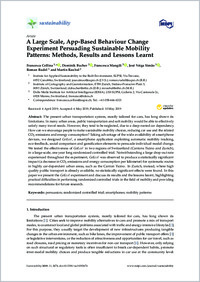A large scale, app-based behaviour change experiment persuading sustainable mobility patterns : methods, results and lessons learnt
- Cellina, Francesca Institute for Applied Sustainability to the Built Environment, SUPSI, Via Trevano, 6952 Canobbio, Switzerland
- Bucher, Dominik Institute of Cartography and Geoinformation, ETH Zurich, Stefano-Franscini-Platz 5, 8093 Zürich, Switzerland
- Mangili, Francesca Istituto Dalle Molle di studi sull'intelligenza artificiale (IDSIA), Facoltà di scienze informatiche, Università della Svizzera italiana, Svizzera
- Veiga Simão, José Institute for Applied Sustainability to the Built Environment, SUPSI, Via Trevano, 6952 Canobbio, Switzerland
- Rudel, Roman Institute for Applied Sustainability to the Built Environment, SUPSI, Via Trevano, 6952 Canobbio, Switzerland
- Raubal, Martin Institute of Cartography and Geoinformation, ETH Zurich, Stefano-Franscini-Platz 5, 8093 Zürich, Switzerland
-
10.05.2019
Published in:
- Sustainability. - 2019, vol. 11, no. 9, p. 2674
English
The present urban transportation system, mostly tailored for cars, has long shown its limitations. In many urban areas, public transportation and soft mobility would be able to effectively satisfy many travel needs. However, they tend to be neglected, due to a deep-rooted car dependency. How can we encourage people to make sustainable mobility choices, reducing car use and the related CO 2 emissions and energy consumption? Taking advantage of the wide availability of smartphone devices, we designed GoEco!, a smartphone application exploiting automatic mobility tracking, eco-feedback, social comparison and gamification elements to persuade individual modal change. We tested the effectiveness of GoEco! in two regions of Switzerland (Cantons Ticino and Zurich), in a large-scale, one year long randomized controlled trial. Notwithstanding a large drop-out rate experienced throughout the experiment, GoEco! was observed to produce a statistically significant impact (a decrease in CO 2 emissions and energy consumption per kilometer) for systematic routes in highly car-dependent urban areas, such as the Canton Ticino. In Zurich, instead, where high quality public transport is already available, no statistically significant effects were found. In this paper we present the GoEco! experiment and discuss its results and the lessons learnt, highlighting practical difficulties in performing randomized controlled trials in the field of mobility and providing recommendations for future research.
- Language
-
- English
- Classification
- Social sciences
- License
- Open access status
- gold
- Identifiers
-
- RERO DOC 328289
- DOI 10.3390/su11092674
- ARK ark:/12658/srd1318931
- Persistent URL
- https://n2t.net/ark:/12658/srd1318931
Statistics
Document views: 211
File downloads:
- Texte intégral: 218
